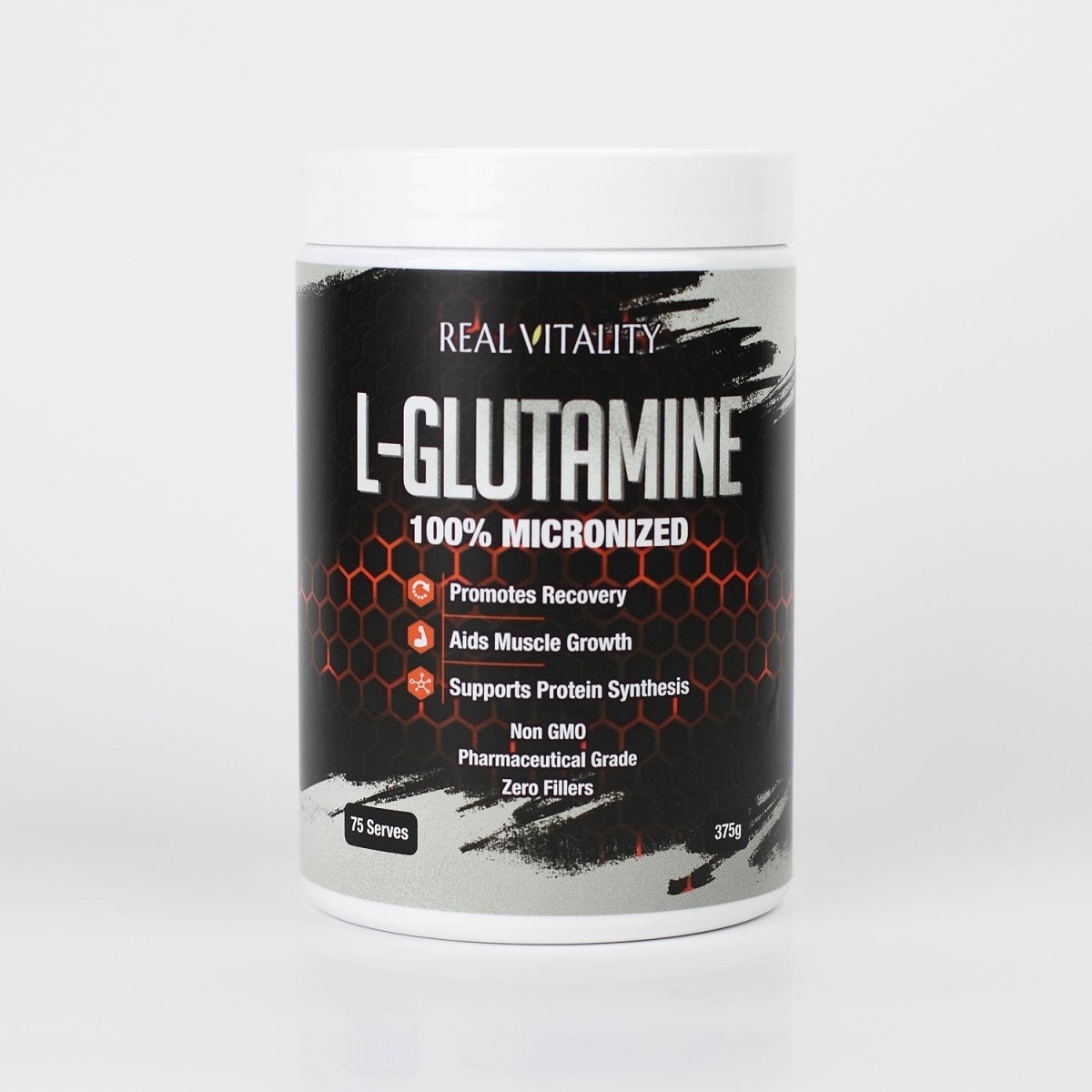
Unlocking the Power of L-Glutamine: The Ultimate Guide to Enhancing Muscle Recovery
Share
Introduction to L-Glutamine and muscle recovery
As people who are passionate about fitness and health, we have always been on the lookout for ways to optimise our workouts and enhance recovery. One such supplement that we have come across is L-Glutamine, an amino acid that has been gaining popularity in recent years for its potential benefits in muscle recovery. In this comprehensive guide, we will delve into the science behind L-Glutamine, its role in muscle repair, and how to choose the best muscle recovery supplement.
L-Glutamine is a non-essential amino acid that is naturally found in the body. It is a building block of protein and serves as a primary nitrogen donor, playing a crucial role in maintaining the body's nitrogen balance. When it comes to muscle recovery, L-Glutamine is involved in various processes that aid in the repair and rebuilding of muscle tissue. It helps the body maintain proper immune function, promotes healthy digestion, and can even support brain function.
Given its numerous benefits, it is no wonder that L-Glutamine has become a popular supplement among athletes and fitness enthusiasts alike. By understanding the role of L-Glutamine in muscle repair and knowing how to incorporate it into your routine, you can unlock its potential to help you achieve optimal muscle recovery.
The role of L-Glutamine in muscle repair
Exercise, particularly intense workouts, can cause muscle damage and stress. This damage triggers the body's natural response to begin repairing the affected muscles, a process that involves the synthesis of proteins and the breakdown and removal of damaged tissue. L-Glutamine plays a key role in this process by serving as a fuel source for immune cells, which are essential for muscle repair and regeneration.
In addition to its role in fueling immune cells, L-Glutamine also has direct effects on muscle tissue. It aids in the synthesis of new proteins, helping to rebuild damaged muscle fibers and promote muscle growth. Additionally, L-Glutamine can help increase the availability of other amino acids needed for muscle repair, further enhancing the recovery process.
Lastly, L-Glutamine has been shown to have anti-inflammatory properties, which can help reduce muscle soreness and inflammation caused by intense workouts. This can lead to a quicker recovery and a reduced risk of injury.
Causes of poor muscle recovery
There are several factors that can contribute to poor muscle recovery, including inadequate nutrition, lack of sleep, and overtraining. Without proper nutrition, the body may not have the necessary building blocks to repair and rebuild muscle tissue effectively. A lack of essential nutrients, like protein and amino acids, can hinder the muscle recovery process and lead to increased muscle soreness and fatigue.
Similarly, inadequate sleep can impair the body's ability to recover from exercise. During sleep, the body produces hormones like human growth hormone (HGH), which is essential for muscle repair and growth. A lack of sleep can reduce the production of these hormones and impair the muscle recovery process.
Overtraining is another factor that can contribute to poor muscle recovery. When you exercise too intensely or too frequently without giving your muscles enough time to recover, you can cause excessive muscle damage and increase the risk of injury. To avoid overtraining, it is important to listen to your body and give yourself adequate rest between workouts.
Benefits of L-Glutamine for muscle recovery
L-Glutamine offers several benefits when it comes to muscle recovery. Some of these benefits include:
-
Enhanced muscle repair and growth: As mentioned earlier, L-Glutamine is involved in the synthesis of new proteins, which is essential for muscle repair and growth. By supplementing with L-Glutamine, you can help provide your body with the necessary building blocks to repair damaged muscle tissue and promote muscle growth.
-
Reduced muscle soreness and inflammation: L-Glutamine's anti-inflammatory properties can help alleviate muscle soreness and inflammation caused by intense workouts. This can lead to a quicker recovery and a reduced risk of injury.
-
Improved immune function: L-Glutamine serves as a fuel source for immune cells, which are essential for muscle repair and regeneration. By supporting immune function, L-Glutamine can help enhance the body's natural ability to recover from exercise.
-
Preservation of muscle mass: During periods of intense exercise or calorie restriction, the body may break down muscle tissue for energy. L-Glutamine can help prevent this muscle breakdown and preserve muscle mass.
How to choose the best muscle recovery supplement
When selecting a muscle recovery supplement, there are several factors to consider:
- Quality: Look for a reputable brand that uses high-quality ingredients and has a good manufacturing process. This ensures that you are getting a pure and effective product.
- Form: L-Glutamine supplements are available in various forms, including powder, capsules, and tablets. Choose a form that is convenient for you and fits your lifestyle.
- Dosage: The optimal dosage of L-Glutamine may vary depending on your individual needs and goals. It is important to follow the recommended dosage guidelines provided by the manufacturer or consult with a healthcare professional to determine the appropriate dosage for you.
-
Additional ingredients: Some muscle recovery supplements may contain additional ingredients, such as electrolytes, branched-chain amino acids (BCAAs), or other amino acids. These ingredients can provide additional benefits for muscle recovery and overall health.
The science behind L-Glutamine and muscle recovery
Numerous studies have investigated the effects of L-Glutamine supplementation on muscle recovery. A review published in the Journal of the International Society of Sports Nutrition found that L-Glutamine supplementation can help reduce muscle soreness and improve recovery following intense exercise.
Another study published in the European Journal of Applied Physiology found that L-Glutamine supplementation can help improve muscle function and reduce inflammation after a strenuous workout. These findings support the idea that L-Glutamine can enhance muscle recovery and help you get back to your workouts sooner.
Natural sources of L-Glutamine
While L-Glutamine supplements can be a convenient way to increase your L-Glutamine intake, you can also obtain this amino acid through your diet. Some natural sources of L-Glutamine include:
- Lean meats (chicken, turkey, beef)
- Fish (salmon, tuna, mackerel)
- Dairy products (milk, yoghurt, cheese)
- Eggs
- Legumes (beans, lentils, chickpeas)
- Nuts and seeds (almonds, walnuts, chia seeds)
Incorporating these foods into your diet can help ensure that you are getting adequate amounts of L-Glutamine to support muscle recovery.
Proper dosage and timing for L-Glutamine supplementation
The optimal dosage of L-Glutamine may vary depending on your individual needs and goals. A common dosage recommendation is 5-10 grams per day, which can be divided into multiple doses throughout the day. It is generally best to take L-Glutamine on an empty stomach, as this can help improve its absorption.
In terms of timing, some experts recommend taking L-Glutamine immediately after exercise to help support muscle recovery. Others suggest taking it before bed to assist with overnight muscle repair and growth. Ultimately, the best timing for L-Glutamine supplementation may depend on your personal preferences and schedule.
Potential side effects and precautions of L-Glutamine
L-Glutamine is generally considered safe when taken in appropriate doses. However, some individuals may experience side effects such as stomach discomfort, nausea, or headaches. If you experience any adverse effects, it is recommended to discontinue use and consult with a healthcare professional.
Additionally, individuals with certain medical conditions, such as kidney or liver disease, should use caution when considering L-Glutamine supplementation. It is always a good idea to consult with a healthcare professional before starting any new supplement regimen.
Unlocking the power of L-Glutamine for optimal muscle recovery
L-Glutamine is a powerful amino acid that can help enhance muscle recovery by promoting muscle repair, reducing inflammation, and supporting immune function. By understanding the role of L-Glutamine in muscle recovery and incorporating it into your routine, you can unlock its potential to help you achieve optimal results from your workouts.
To get the most out of L-Glutamine, choose a high-quality supplement like our L-Glutamine below, follow proper dosage guidelines, and consider incorporating natural sources of L-Glutamine into your diet. By doing so, you can help support your body's natural ability to recover from exercise and get back to your workouts sooner.









